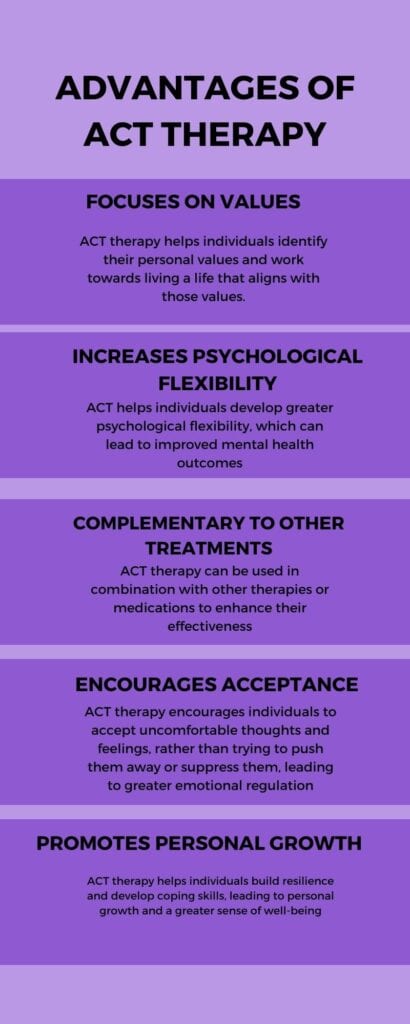At Resilience Behavioral Health, we understand addiction and mental health therapy. We provide comprehensive therapy programs to help you or a loved one recover. Our center offers tailor-made treatment plans to maximize results. These plans can include psychotherapy, addiction education sessions, ACT Therapy and supported living programs.
Resilience Behavioral Health is a true dual diagnosis treatment center, meaning we can simultaneously treat addiction and any underlying mental health conditions. To learn more about our co-occurring rehab program, please contact us today at 888.401.1179. We can help address underlying issues triggering addiction. Help find the right addiction therapy program for you or a loved one.

Understanding ACT Therapy
If you’re looking for a therapy approach that focuses on helping you overcome mental health challenges, ACT Therapy can help. ACT therapy will help change your relationship with your thoughts and feelings. ACT is a trauma-informed approach that helps individuals develop psychological flexibility and live a more meaningful life.
What is the Difference Between ACT and CBT?
ACT is often compared to Cognitive Behavioral Therapy (CBT), another popular form of psychotherapy. Both approaches aim to help people change their thoughts and behaviors. ACT focuses on promoting psychological flexibility and accepting uncomfortable thoughts and feelings. This can be much more productive than trying to eliminate them all together.
What is an Example of ACT Therapy?
A client struggling with anxiety may use ACT therapy to learn mindfulness techniques and acceptance of their thoughts and feelings. The therapist may guide them to identify and connect with their values. Encouraging them to take action towards their goals despite any discomfort or fear. By practicing these skills, the client can develop psychological flexibility and improve their overall well-being.
The Six Principles of ACT Therapy
ACT is built on six core principles:
Acceptance: The first principle of ACT involves accepting that uncomfortable thoughts and feelings are a natural part of the human experience.
Cognitive Defusion: The second principle involves learning to see thoughts as mental events rather than reality.
Contact with the Present Moment: The third principle involves becoming aware of the present moment and staying present rather than being lost in thoughts about the past or future.
The Observing Self: The fourth principle involves recognizing that we are more than our thoughts and feelings, and learning to observe them without judgment.
Values: The fifth principle involves identifying and committing to personal values that are meaningful to the individual.
Committed Action: The final principle involves taking action in line with one’s values, even when faced with uncomfortable thoughts or feelings.
What is it used for?
ACT therapy is used to help individuals overcome a wide range of mental health challenges and improve their overall quality of life. This type of therapy has been found to be particularly effective in treating anxiety, depression, OCD, PTSD, and substance abuse disorders. It is also helpful for individuals who struggle with chronic pain, stress, and relationship issues. Rather than simply managing symptoms, ACT therapy helps individuals develop the skills and tools they need to create a rich, fulfilling life. By building psychological flexibility and resilience, individuals can learn to thrive even in the midst of challenging situations.
What are the Advantages?
Focuses on values: ACT therapy helps individuals identify their personal values and work towards living a life that aligns with those values.
Increases psychological flexibility: ACT helps individuals develop greater psychological signs, which can lead to improved mental health outcomes.
Complementary to other treatments: ACT therapy can be used in combination with other therapies or medications to enhance their effectiveness.
Encourages acceptance: ACT therapy encourages individuals to accept uncomfortable thoughts and feelings, rather than trying to push them away or suppress them, leading to greater emotional regulation.
Promotes personal growth: ACT therapy helps individuals build resilience and develop coping life skills, leading to personal growth and a greater sense of well-being.

Contact Resilience Behavioral Health to Find ACT Therapy in Boston,MA
At Resilience Behavioral Health, acceptance and commitment therapy is integrated into our therapy treatment programs in Massachusetts. Our dual diagnosis facility offers comprehensive treatment for substance use and mental health disorders. With the help of a acceptance and commitment therapy program, you or a loved one can learn how to recover and maintain sobriety.
Let us help you find an addiction therapy program suitable for you. Contact us at 888.401.1179 to learn how ACT can help you retain the best quality of life!

